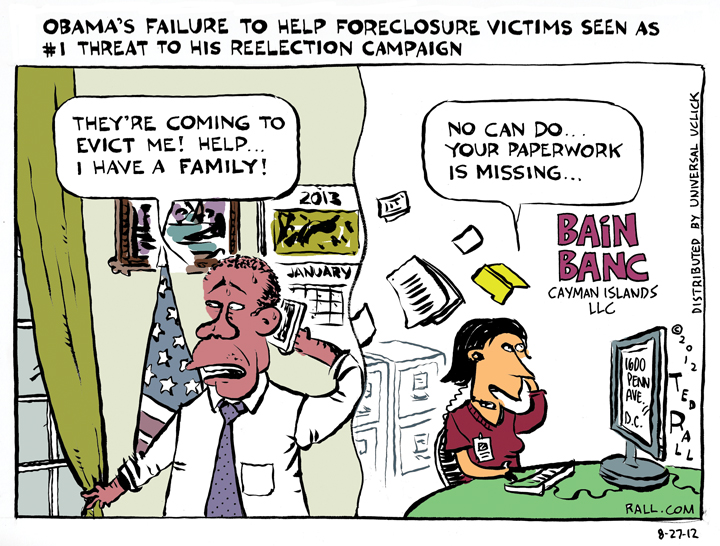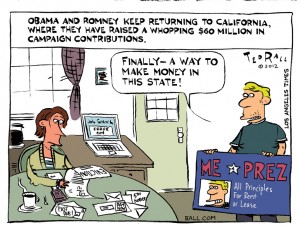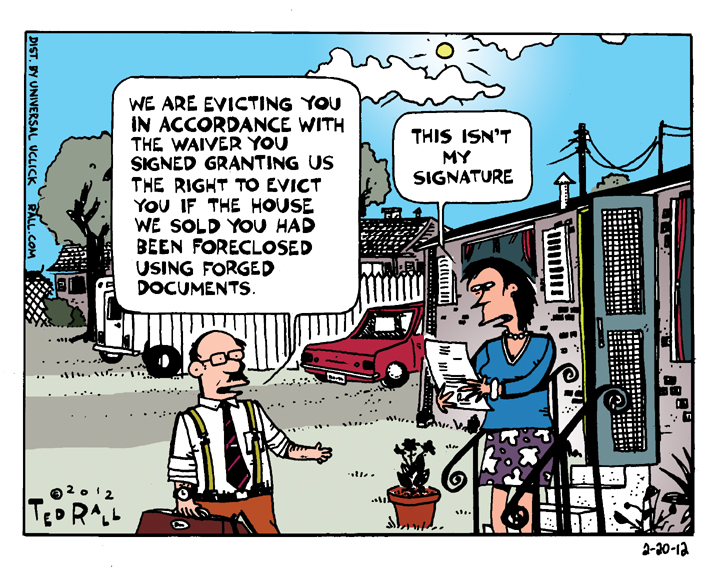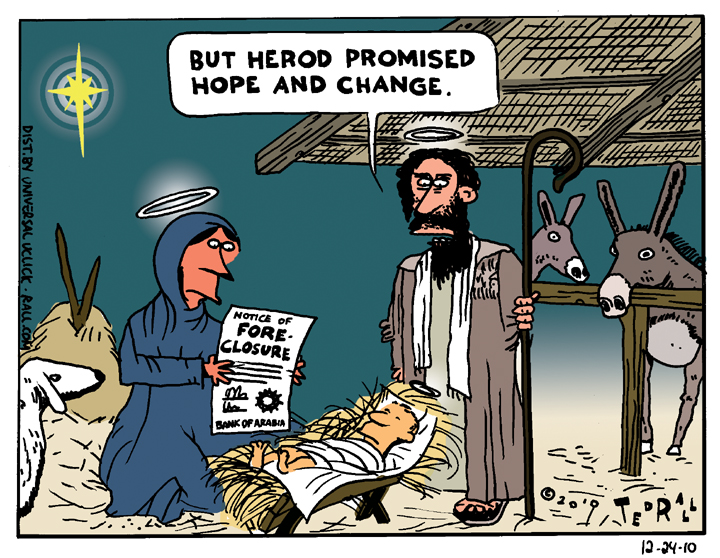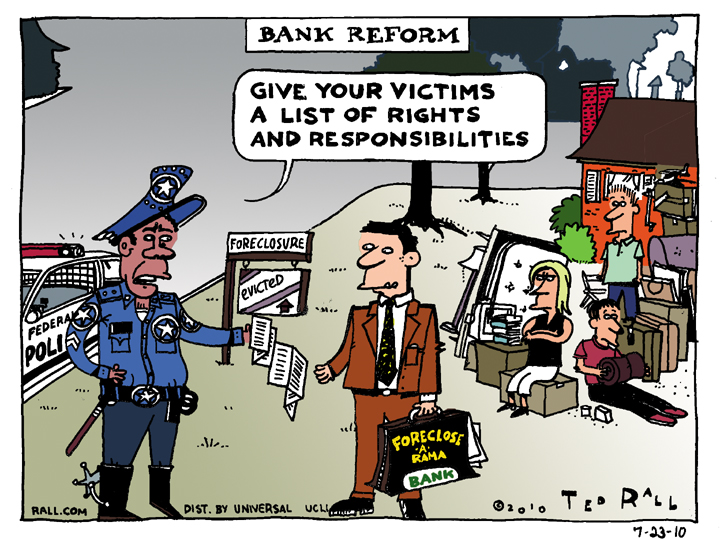Obama tried to finesse his response to the housing crash, rejecting a bailout of homeowners facing foreclosure in favor of a limited aid program and a bet that a recovering economy would take care of the rest. Millions of people lost their homes and the recovery never materialized. The economy is now the primary threat to Mr. Obamaâs bid for a second term, and economists and political allies say the Obama’s non-response to the housing crisis was the administrationâs most significant mistake.
SYNDICATED COLUMN: Lead, or Follow and Get Out of the Race
Voters Turn Against Pols’ Follow-the-Polls Strategy
In order to be a good leader, Disraeli said, “I must follow the people.”
Aided and abetted by toe-sucking pollster Dick Morris, Bill Clinton finessed the art of leading from the rear, relying on Morris’ tracking surveys to help him decide everything from whether to bomb Serbia to when and if to take a vacation.
By definition, however, leaders point where their followers should go. Americans haven’t seen much real leadership on the federal level since Reagan. Where there’s been progress, such as on gay rights, the President only stepped forward after public opinion had shifted enough to make it safe.
For the first time in 30 years, Dick Morris’ follow-the-voters strategy appears to be running out of steam. This year, the electorate seems to be hungering for presidents in the mold of TR, FDR and LBJ—old-school leaders who painted ambitious visions of where America could go and why it should, who took political gambles that the people might not be ready for what they had in mind, who anticipated crises and challenges before anyone else, and explained why we had to act sooner rather than later.
The craving for leadership is evident in the polls. Though personally popular and enjoying the advantages of incumbency, President Obama is running neck and neck against Mitt Romney, an awkward candidate from a minority religion who has trouble connecting with, and is seen as out of touch by, ordinary voters.
Democrats must be worried. Historically, Republican presidential nominees typically gain on Democrats throughout the fall. At this point in the game, Democrats need a substantial lead in order to emerge victorious in November.
What’s going wrong? Mainly, it’s the economy. It sucks. Still. Democrats say the President inherited the meltdown from Bush. But Americans blame Obama.
“The nation’s painfully slow pace of growth is now the primary threat to Mr. Obama’s bid for a second term, and some economists and political allies say the cautious response to the housing crisis was the administration’s most significant mistake,” reports The New York Times. Obama’s big screw-up: “He tried to finesse the cleanup of the housing crash, rejecting unpopular proposals for a broad bailout of homeowners facing foreclosure in favor of a limited aid program—and a bet that a recovering economy would take care of the rest.”
Recovery? What recovery?
The depressed housing market, coupled with the reduced purchasing power of tens of millions of Americans who lost their homes to eviction and/or foreclosure, makes recovery unlikely to impossible for the foreseeable future.
Many people, including yours truly, warned that the millions of Americans who were evicted under foreclosure, many of them illegally, were more “too big to fail” than Citigroup. Some, like former Congressman Jim Marshall (D-GA), voted for TARP, but urged the Obama Administration to condition the bailout on forcing the banks to refinance mortgages and write down principal to reflect the new reality of lower housing prices. “There was another way to deal with this, and that is what I supported: forcing the banks to deal with this. It would have been better for the economy and lots of different neighborhoods and people owning houses in those neighborhoods,” Marshall says.
Voters aren’t mad at Obama for not being clairvoyant. They’re pissed off because he ignored people who were smart and prescient in favor of those who were clueless and self-interested, like Tim Geitner. He may be about to pay a price for that terrible decision.
Tens of millions of Americans already have.
Speaking of leadership—the art of seeing what comes next and doing something about it—what looming problems are the political class ignoring today?
It’s too late to stop the 2008-to-2012 economic meltdown. But it’s still possible for Obama (or, theoretically, Romney) to get ahead of the economy—permanent unemployment benefits, anybody?—and other pressing issues.
Australia, for example, is taking the climate change crisis seriously.
Americans want leaders who point the way forward, to anticipate monsters we can’t yet imagine. For example, there is a huge looming crisis: pensions. In 10 to 15 years, Generation Xers will hit traditional retirement age. How will they eat?
Close to none have traditional defined-benefit pension plans. Gen Xers, who earn far less than the Baby Boomers at the same age, have been shunted into 401(k)s, which turned out to be a total ripoff: the average rate of return between 1999 and 2010 was 0.3 percent.
Total.
And much of that was withdrawn—under penalty—to subsist after layoffs.
“[Gen Xers] have no savings, and what they had was devastated by two market crashes,” said Andrew Eschtruth of the Center for Retirement Research. “They never got off the ground.”
If you’re 45 years old now and just beginning to save for retirement, financial planners say you should save 41 percent of your income annually (if you haven’t gotten laid off again). As if. Half of Gen Xers live hand to mouth; the rest save a piddling six percent a year.
The Gen X retirement crisis represents 46 million people waiting for a savior—and 46 million potential votes.
Attention Mssrs. Obama, Romney and anyone else presenting yourself as a would-be leader: Don’t just read the polls. Don’t follow us. Show that you care about, and have a credible plan to confront, the problems of the future. If you do that—and we’re not holding our breaths—we’ll pay attention to you.
(Ted Rall’s new book is “The Book of Obama: How We Went From Hope and Change to the Age of Revolt.” His website is tedrall.com. This column originally appeared at NBCNews.com’s Lean Forward blog.)
COPYRIGHT 2012 TED RALL
Los Angeles Times Cartoon: Me 4 Prez
I draw cartoons for The Los Angeles Times about issues related to California and the Southland (metro Los Angeles).
This week: Obama and Romney keep returning to California, where they have raised a whopping $60 million in campaign contributions.
SYNDICATED COLUMN: Another Obama Sellout
Mortgage Settlement a Sad Joke
Joe Nocera, the columnist currently challenging Tom Friedman for the title of Hackiest Militant Centrist Hack—it’s a tough job that just about everyone on The New York Times op-ed page has to do—loves the robo-signing settlement announced last week between the Obama Administration, 49 states and the five biggest mortgage banks. “Two cheers!” shouts Nocera.
Too busy to follow the news? Read Nocera. If he likes something, it’s probably stupid, evil, or both.
As penance for their sins—securitizing fraudulent mortgages, using forged deeds to foreclose on millions of Americans and oh, yeah, borking the entire world economy—Ally Financial, Bank of America, Citibank, JPMorgan Chase and Wells Fargo have agreed to fork over $5 billion in cash. Under the terms of the new agreement they’re supposed to reduce the principal of loans to homeowners who are “underwater” on their mortgages—i.e. they owe more than their house is worth—by $17 billion.
Some homeowners will qualify for $3 billion in interest refinancing, something the banks have resisted since the ongoing depression began in late 2008.
What about those who got kicked out of their homes illegally? They split a pool of $1.5 billion.
Sounds impressive. It’s not. Mark Zuckerberg is worth $45 billion.
“That probably nets out to less than $2,000 a person,” notes The Times. “There’s no doubt that the banks are happy with this deal. You would be, too, if your bill for lying to courts and end-running the law came to less than $2,000 per loan file.”
Readers will recall that I paid more than that for a speeding ticket. 68 in a 55.
This is the latest sellout by a corrupt system that would rather line the pockets of felonious bankers than put them where they belong: prison.
Remember TARP, the initial bailout? Democrats and Republicans, George W. Bush and Barack Obama agreed to dole out $700 billion in public—plus $7.7 trillion funneled secretly through the Fed—to the big banks so they could “increase their lending in order to loosen credit markets,” in the words of Senator Olympia Snowe, a Maine Republican.
Never happened.
Three years after TARP “tight home loan credit is affecting everything from home sales to household finances,” USA Today reported. “Many borrowers are struggling to qualify for loans to buy homes…Those who can get loans need higher credit scores and bigger down payments than they would have in recent years. They face more demands to prove their incomes, verify assets, show steady employment and explain things such as new credit cards and small bank account deposits. Even then, they may not qualify for the lowest interest rates.”
Financial experts aren’t surprised. TARP was a no-strings-attached deal devoid of any requirement that banks increase lending. You can hardly blame the bankers for taking advantage. They used the cash—money that might have been used to help distressed homeowners—to grow income on their overnight “float” and issue record raises to their CEOs.
Next came Obama’s “Home Affordable Modification Program” farce. Another toothless “voluntary” program, HAMP asked banks to do the same things they’ve just agreed to under the robo-signing settlement: allow homeowners who are struggling to refinance and possibly reduce their principals to reflect the collapse of housing prices in most markets.
Voluntary = worthless.
CNN reported on January 24th: “The HAMP program, which was designed to lower troubled borrowers’ mortgage rates to no more than 31% of their monthly income, ran into problems almost immediately. Many lenders lost documents, and many borrowers didn’t qualify. Three years later, it has helped a scant 910,000 homeowners—a far cry from the promised 4 million.”
Or the 15 million who needed help.
As usual, state-controlled media is too kind. Banks didn’t “lose” documents. They threw them away.
One hopes they recycled.
I wrote about my experience with HAMP: Chase Home Mortgage repeatedly asked for, received, confirmed receiving, then requested the same documents. They elevated the runaround to an art. My favorite part was how Chase wouldn’t respond to queries for a month, then request the bank statement for that month. They did this over and over. The final result: losing half my income “did not represent income loss.”
It’s simple math: in 67 percent of cases, banks make more money through foreclosure than working to keep families in their homes.
This time is different, claims the White House. “No more lost paperwork, no more excuses, no more runaround,” HUD secretary Shaun Donovan said February 9th. The new standards will “force the banks to clean up their acts.”
Don’t bet on it. The Administration promises “a robust enforcement mechanism”—i.e. an independent monitor. Such an agency, which would supervise the handling of million of distressed homeowners, won’t be able to handle the workload according to mortgage experts. Anyway, it’s not like there isn’t already a law. Law Professor Alan White of Valparaiso University notes: “Much of this [agreement] is restating obligations loan servicers already have.”
Finally, there’s the issue of fairness. “Underwater” is a scary, headline-grabbing word. But it doesn’t tell the whole story.
Tens of millions of homeowners have seen the value of their homes plummet since the housing crash. (The average home price fell from $270,000 in 2006 to $165,000 in 2011.) Those who are underwater tended not to have had much equity in their homes in the first place, having put down low downpayments. Why single them out for special assistance? Shouldn’t people who owned their homes free and clear and those who had significant equity at the beginning of crisis get as much help as those who lost less in the first place? What about renters? Why should people who were well-off enough to afford to buy a home get a payoff ahead of poor renters?
The biggest fairness issue of all, of course, is one of simple justice. If you steal someone’s house, you should go to jail. If your crimes are company policy, that company should be nationalized or forced out of business.
Your victim should get his or her house back, plus interest and penalties.
You shouldn’t pay less than a speeding ticket for stealing a house.
(Ted Rall is the author of “The Anti-American Manifesto.” His website is tedrall.com.)
COPYRIGHT 2012 TED RALL

